As you step onto a fishing boat in Cozumel, you’ll be immediately struck by dazzling beauty. The turquoise waters stretch out before you, the sun casts a soft glow, and schools of colorful fish swim near the coral reefs. You’ll feel the salty breeze on your face, filling you with a sense of excitement. That’s the anticipation you’ll have when you’re about to go fly fishing in Cozumel.

This gorgeous island off the coast of Mexico’s Yucatan Peninsula is known for its crystal-clear waters, stunning coral reefs, and diverse fish species that call these waters home. Fly fishing here is particularly popular both among locals and visiting anglers – and for good reason. There are three lagoons at the northern end of the island alone!
Read on to discover the most popular fly fishing catches in the area, the best ways to cast a fly, and the most productive spots to explore. This is the complete guide to Cozumel fly fishing.
What can I catch while fly fishing in Cozumel?
The range of species you can catch on the fly in Cozumel is impressive. The island’s secluded flats are teeming with anything from the “Big Three” – Bonefish, Tarpon, and Snook – to Jack Crevalle and Barracuda. If you take your adventure just a bit further offshore, your fly rod will be greeted with Sailfish, Tuna, and Mahi Mahi.
Bonefish

The “Ghost of the Flats” earned a name for itself years ago. The elusive Bonefish is among the most sought-after fish species in Cozumel, especially on the fly. From March through May and again in mid-fall, the northern lagoons are the perfect spot to pursue Bonefish. However, that doesn’t mean you can’t find them any other time of the year – you just need to be lucky enough to find the right spot.
Bonefish thrive in extremely shallow waters, which is why they’re often tailing in the island’s flats and lagoons. Look for areas with a mixture of sand, grass, and coral heads, especially when the fish are feeding.
Locals prefer to use an 8 or 9 wt rod with a weight-forward line. Pair it with a 10′ leader and a 10–12 lb test tippet, since Bonefish have excellent eyesight and get easily spooked by heavy leaders.
Permit
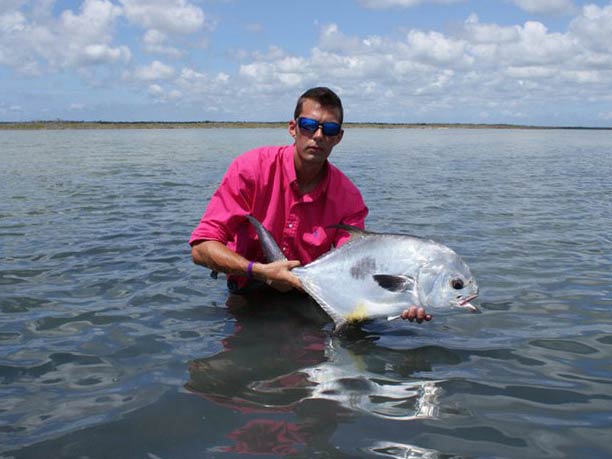
Cozumel’s flats and nearshore reefs are the place to be if you’re after Permit. Another elusive species, these are among the most challenging fish to catch on the fly, making them a favorite even for experienced anglers.
Look for Permit along the edges of the reefs or explore the island’s flats. Similar to Bonefish, these gorgeous creatures patrol the local waters all year long, although they’re much more active during summer and fall. While fly fishing during the peak season increases your chances at a successful catch, Permit are still really hard to fool.
These creatures also have good eyesight, so avoiding heavy leaders is best. Stick to a 9–10′ leader with a 12–16 lb test tippet. Use a 9 or 10 wt rod with a weight-forward floating or intermediate line. When it comes to flies, crab and shrimp imitations work well, although you might want to check with your guide what fly they think works best.
Tarpon
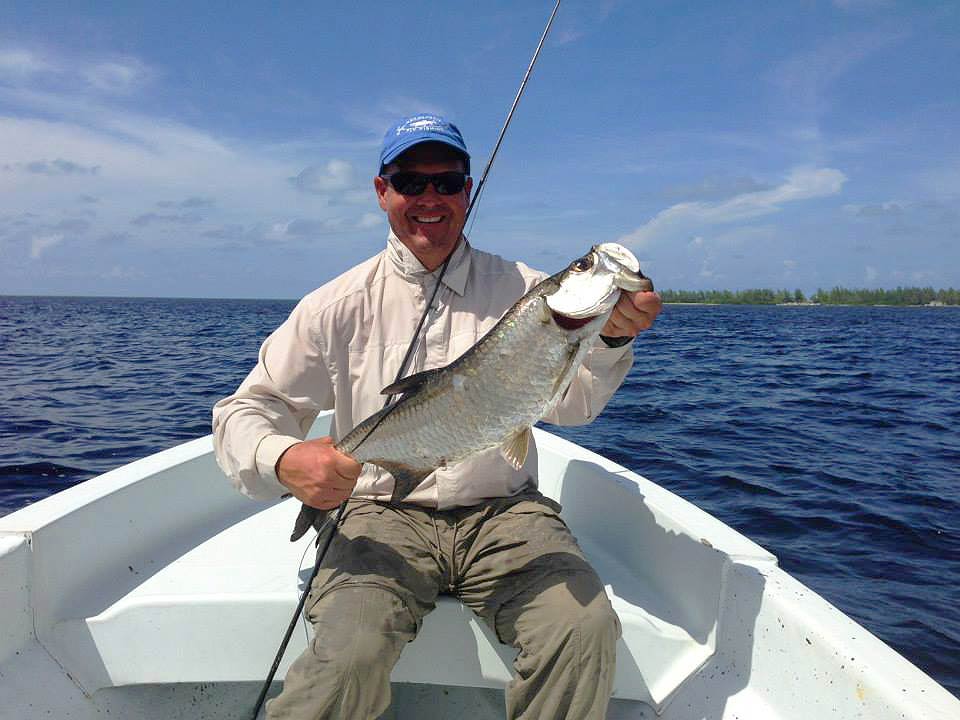
If the conditions are right and the stars align, you can come across a 100 lb Tarpon in Cozumel. That’s right, the Silver Kings here can grow to be pretty impressive, especially if you’re fishing in the island’s deeper waters.
Tarpon also patrol Cozumel’s lagoons and estuaries, as well as rocky areas and nearshore reefs. If you know where to look, you can find a Silver King rolling on the surface or in deeper channels. The season typically runs from May to September, peaking in June and July.
So, how does your Tarpon fly fishing setup differ from what you’ll need to catch Permit and Bonefish? Some local anglers recommend using a 10–11 wt rod with a 9 or 10′ leader and a 40–60 lb test tippet, since Tarpon can easily wear through lighter tippets. If you’re planning to target Tarpon, Bonefish, and Permit all on the same trip, consider a two-rod approach.
Snook
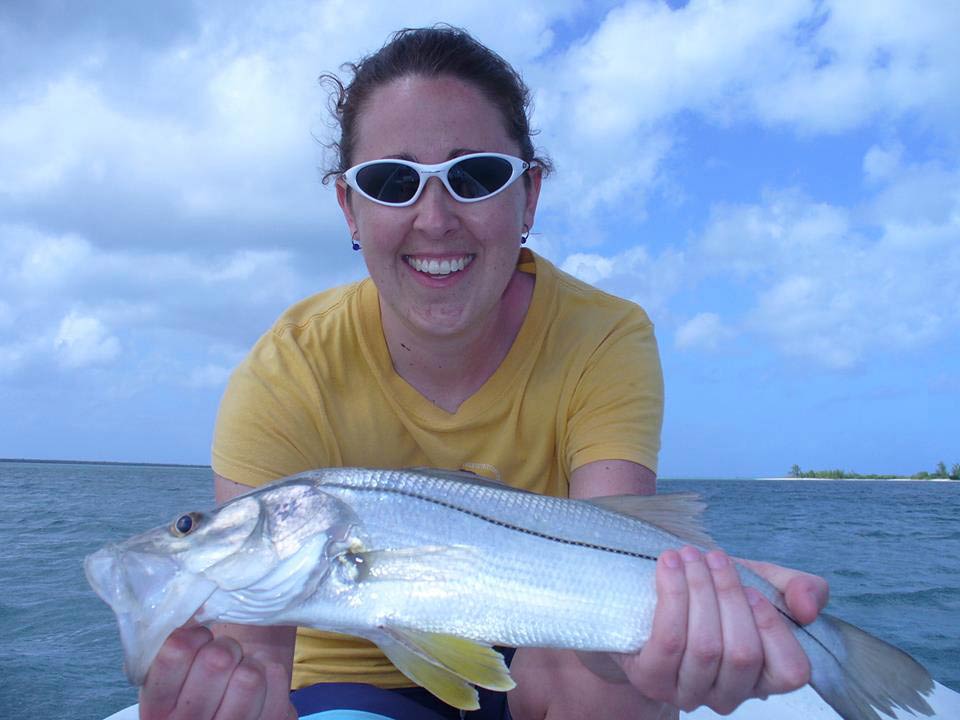
Hardly anyone would refuse a fly fishing trip for Snook, especially when fishing in Cozumel. These strong fish inhabit the island’s mangrove-lined lagoons. The northern area’s lagoons – Monte Cristo, Paso Belem, and Rio de la Plata – are perfect for fly fishing for Snook.
The best time to hunt for Snook is March through August, although you can definitely find these fish throughout the year. Pack an 8 or 9 wt rod with a weight-forward floating line and pair it with a 20–30′ leader and a 20-30 lb test tippet.
Jack Crevalle
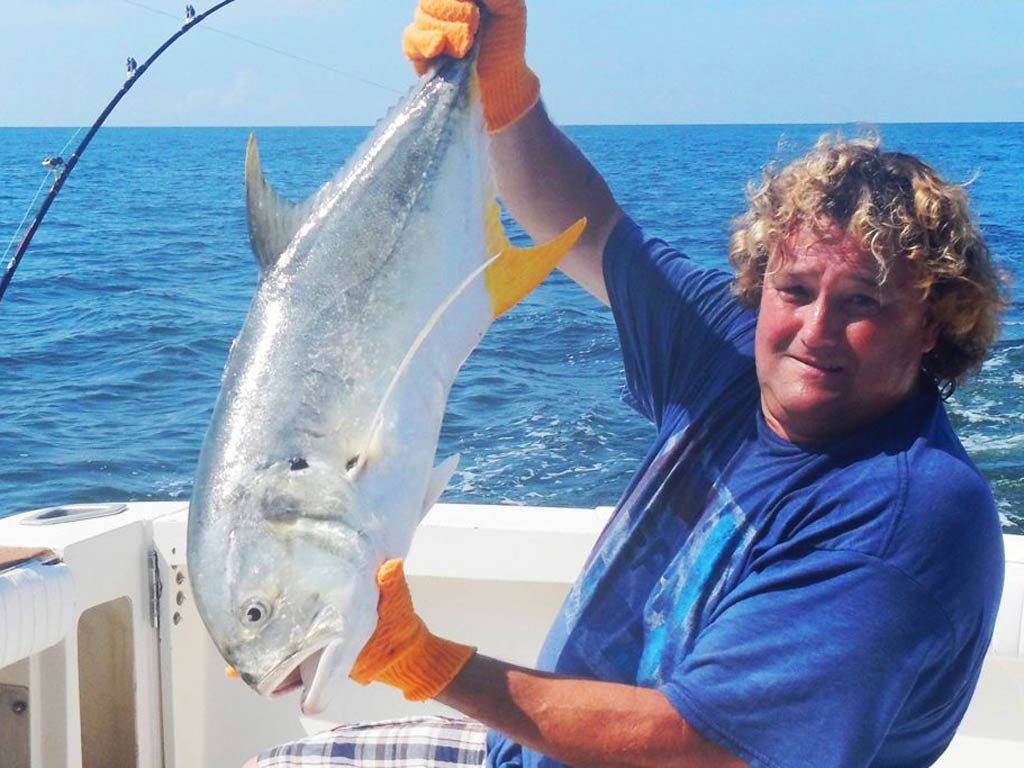
Jack Crevalle don’t just get an honorable mention. These strong and aggressive fish are popular targets for all light tackle enthusiasts, including fly fishermen. Cozumel’s flats, nearshore reefs, and rocky areas are perfect spots to look for Jacks.
Perhaps the best part about fly fishing for Jack Crevalle is their availability. That doesn’t mean that they’ll jump right on board, though. Despite that, the Cozumel JC fishing season is pretty generous, offering good bites throughout the year. If you absolutely must target Jacks during their peak season, consider September, November, December, and January.
Your fly fishing setup for Jack Crevalle will be similar to what you’ll need to catch other species. Consider the same rod you’ll use for Bonefish, paired with a 9 or 10′ leader and a 20–30 lb test tippet.
Where can I go fly fishing in Cozumel?
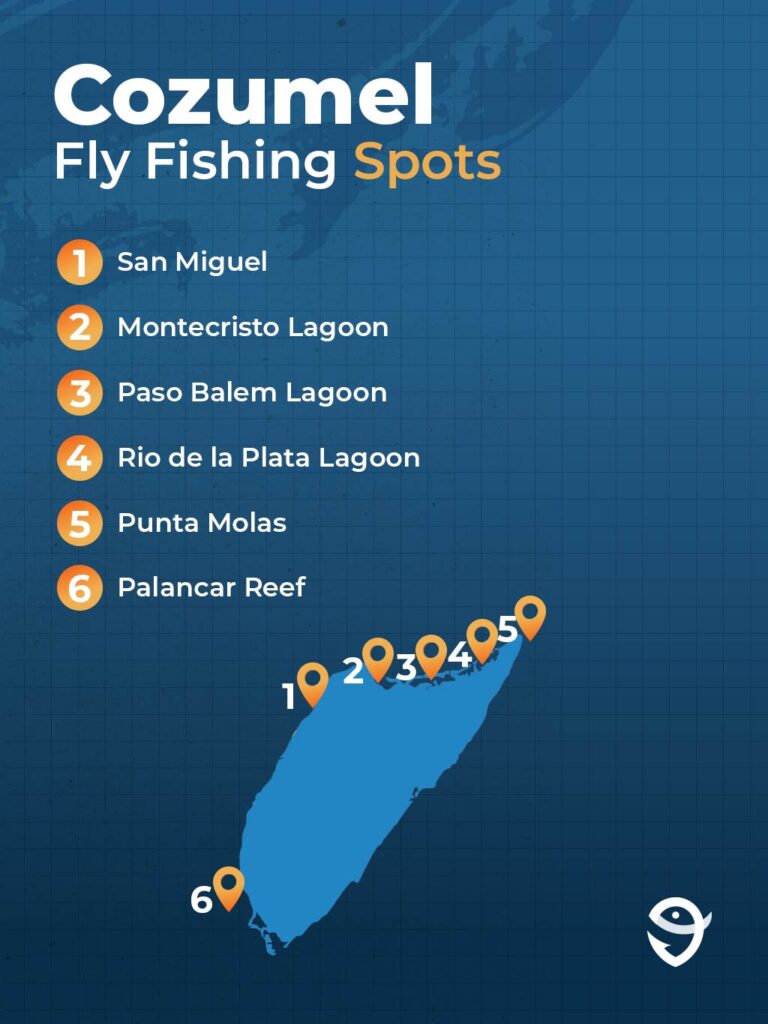
The short answer is: anywhere. The only area you’ll want to avoid is the protected zone around the National Marine Reserve Park. Other than that, you’re welcome to explore Cozumel’s waters on the fly as much as you want.
Here are some places to get you started:
- Punta Molas: Punta Molas is located on the northern tip of the island and offers some of the best bonefishing in Cozumel thanks to its shallow flats and clear water.
- San Miguel: Located on the western side of the island, this spot offers excellent fly fishing for Tarpon. The area is known for its deep waters and rocky structure.
- Palancar Reef: This is a reef on the southern side of the island with stunning coral formations and clear waters. It’s also home to Bonefish, Permit, and Tarpon.
- Montecristo Lagoon: This northern lagoon is surrounded by wild scenery and mangrove forests, offering excellent chances to fly fish for Tarpon, Bonefish, and Permit.
- Paso Balem Lagoon: This is another spot on the northern tip of Cozumel, offering world-class fly fishing opportunities.
- Rio de la Plata Lagoon: The third lagoon on the northern end of Cozumel is one more prime spot for flats fishing for Bonefish, Permit, and Tarpon.
How can I go fly fishing in Cozumel?
There are several options available for anyone looking to discover Cozumel’s fly fishing opportunities. Just by reading this, you’re almost there! You know what you can find and where to go. Now you can plan your trip in advance, pick your desired target and the best month to catch ’em, pack your gear, and come to Cozumel to test your luck.
Or you can book a fly fishing charter with a local guide, which is the easiest way to ensure a productive experience. A professional Cozumel fly fishing guide will know the area like the back of their hand. Some have been fishing in the area for decades, often passing their knowledge from one generation to the other.
Flats Fishing
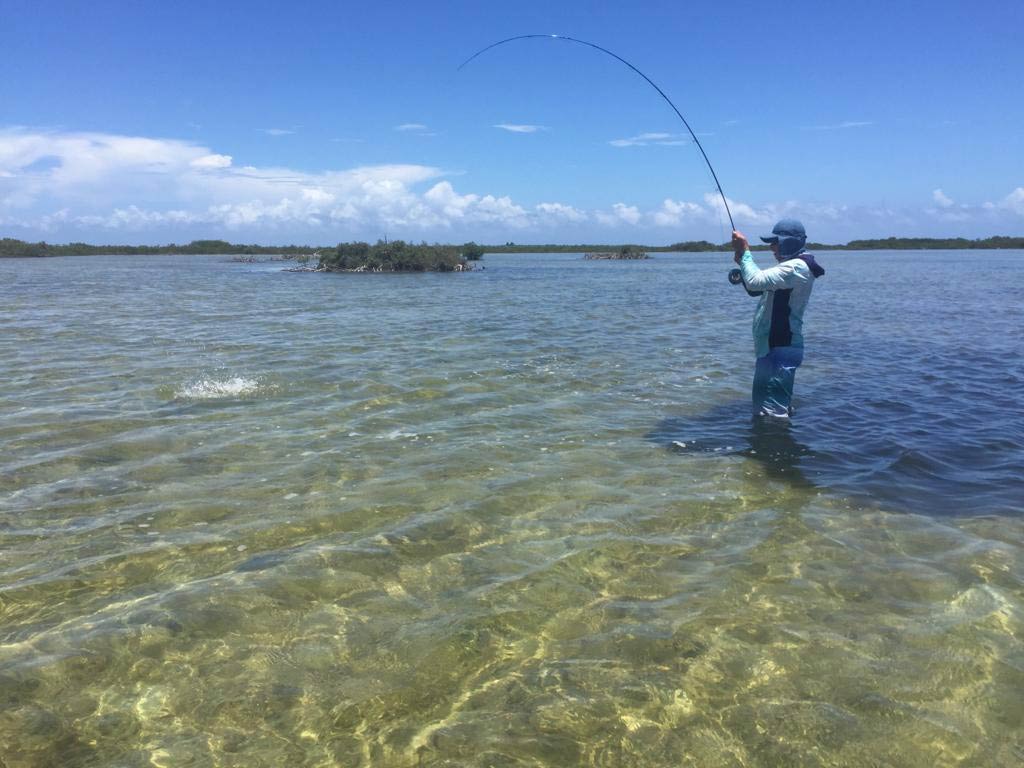
If you wander north from town, you’ll hit calm, shallow lagoons within a mile or two. These waters stay productive throughout the year. True, the IGFA’s inshore hit list is more available during certain times of the year than others, but there’s never a closed season.
A lot of Cozumel anglers prefer to wade the lagoons, flats, and mangroves, as the waters are pretty shallow. However, you can hop on a flats boat and reach a couple of more remote spots, too.
Big Game Fly Fishing
If Tarpon, Permit, and Bonefish aren’t big enough for you, there are always the offshore waters. As you move away from the lagoons, you can reach deep blue waters that are home to much larger species.
Sailfish, Mahi Mahi, Blackfin Tuna, and Marlin are all in the cards for big game fly fishing lovers. The best part about deep sea fly fishing is that you don’t really have to go too far out. Marlin and Sailfish, for example, bite just a couple of miles from shore.
Fly Fishing Gear
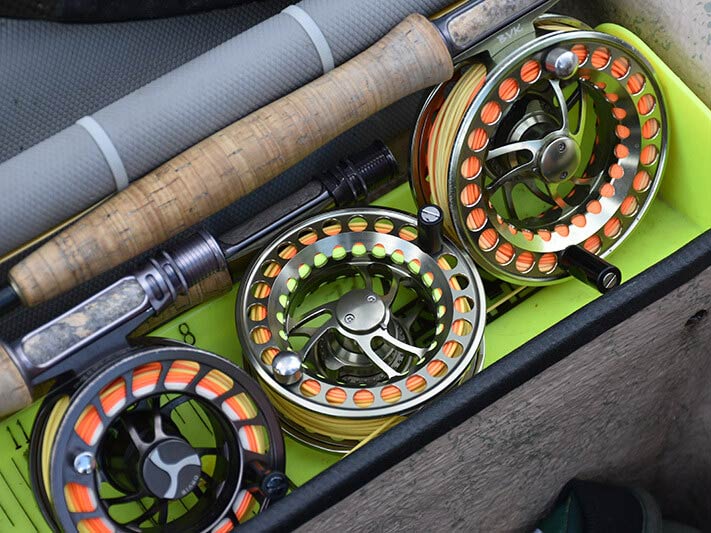
If you book a trip with a guide, you may not need to pack an entire suitcase with your tackle. The majority of fly fishing guides in Cozumel stock quality equipment, tailored to the exact species you want to target.
When you’re out on the flats, you can use anything from a 6–10 wt rod. Larger class tippets and beefier shock tippets are a must for larger fish, such as Tarpon and Barracuda. For longer casts, pack a weight-forward floating or intermediate line.
Once you’ve reached the deeper waters, you’ll need to switch to heavier gear. 14, 16, or even 18 wt rods along with heavy-duty sinking lines and double-hooked big game flies are necessities for Billfish and other big game species.
When should I go fly fishing in Cozumel?

As we mentioned earlier, fly fishing in Cozumel is a year-round pleasure if you don’t mind what you can target. There’s always something biting, be it Bonefish or Sailfish.
Bonefish are found throughout the year in the lagoons on shallow sandy flats, grassy flats, mangroves, coves, and bays. However, the water temperature can have a major effect on their behavior. In the winter months, for example, the wind can cool the lagoons, making the fish less active.
Similarly, the flats can become too warm and hold little oxygen in the middle of the day in summer. Plan your trip early in the morning or late in the day, unless a cool breeze blows in.
Overall, spring and fall are probably the best time to go fly fishing in Cozumel. Some anglers prefer to fish at sunset or just after, while others have success at all times of the day.
Fly Fishing in Cozumel FAQs
Fly Fishing in Cozumel: Recharge Your Soul
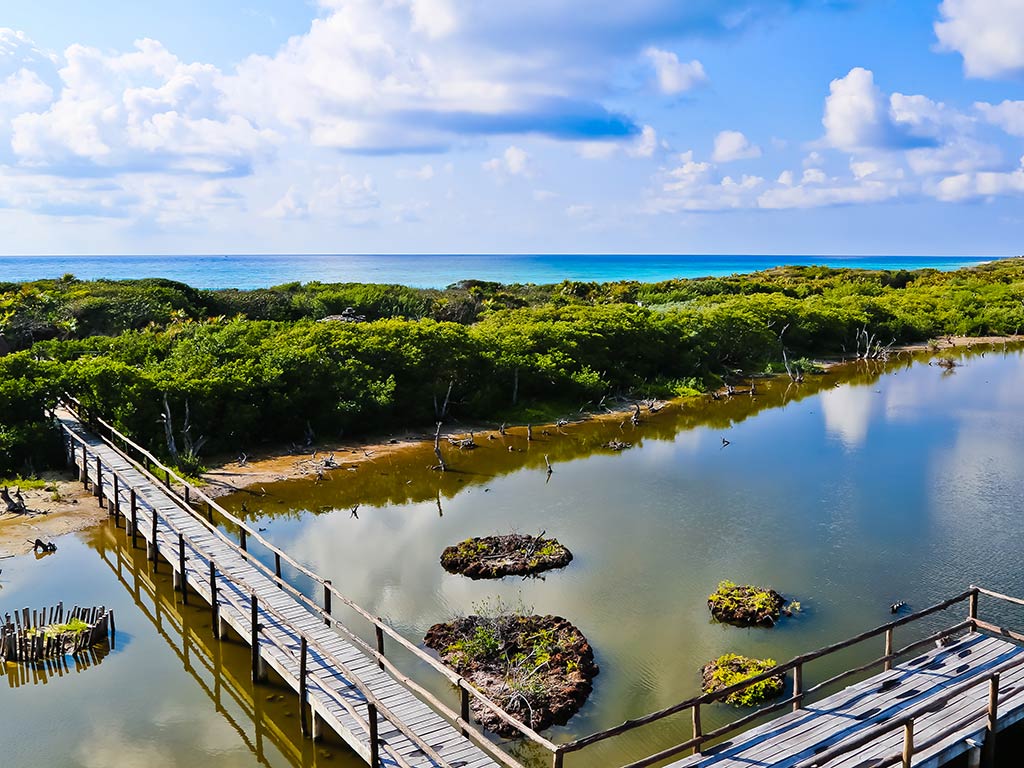
It’s almost impossible to resist a fly fishing trip in a stunning tropical setting. With the right equipment and knowledge, fly fishing in Cozumel can be a truly unforgettable experience. Here, it’s not really just about catching the fish. You’ll get the chance to immerse yourself in beautiful nature and feel connected with the world around you. The fishing is also a serious bonus!
Have you ever been fly fishing in Cozumel? Do you prefer to explore the flats or the deep waters offshore? Do you have any fish stories you’d like to share? Let us know in the comments below!
The post Cozumel Fly Fishing: The Complete Guide appeared first on FishingBooker Blog.
https://ift.tt/ySNgKFY
0 Comments
Enregistrer un commentaire